Hyundai Venue: Suspension System / Troubleshooting
Symptom
|
Possible cause
|
Remedy
|
Hard steering
|
Improper front wheel alignment
|
Correct
|
Excessive turning resistance of lower arm ball joint
|
Replace
|
Low tire pressure
|
Adjust
|
No power assist
|
Repair and replace
|
Poor return of steering wheel to center
|
Improper front wheel alignment
|
Correct
|
Poor or rough ride
|
Improper front wheel alignment
|
Correct
|
Malfunctioning shock absorber
|
Repair or replace
|
Broken or worn stabilizer
|
Replace
|
Broken or worn coil spring
|
Replace
|
Worn lower arm bushing
|
Replace the lower arm assembly
|
Abnormal tire wear
|
Improper front wheel alignment
|
Correct
|
Improper tire pressure
|
Adjust
|
Malfunctioning shock absorber
|
Replace
|
Wandering
|
Improper front wheel alignment
|
Correct
|
Poor turning resistance of lower arm ball joint
|
Repair
|
Loose or worn lower arm bushing
|
Retighten or replace
|
Vehicle pulls to one side
|
Improper front wheel alignment
|
Correct
|
Excessive turning resistance of lower arm ball joint
|
Replace
|
Broken or worn coil spring
|
Replace
|
Bent lower arm
|
Repair
|
Steering wheel shimmy
|
Improper front wheel alignment
|
Correct
|
Poor turning resistance of lower arm ball joint
|
Replace
|
Broken or worn stabilizer
|
Replace
|
Worn lower arm bushing
|
Replace
|
Malfunctioning shock absorber
|
Replace
|
Broken or worn coil spring
|
Replace
|
Bottoming
|
Broken or worn coil spring
|
Replace
|
Malfunctioning shock absorber
|
Replace
|
Wheel / tire noise, vibration and harshness concerns are directly related to
vehicle speed and are not generally affected by acceleration, coasting or decelerating.
Also, out-of-balance wheel and tires can vibrate at more than one speed. A vibration
that is affected by the engine rpm, or is eliminated by placing the transmission
in Neutral is not related to the tire and wheel. As a general rule, tire and
wheel vibrations felt in the steering wheel are related to the front tire and
wheel assemblies. Vibrations felt in the seat or floor are related to the rear
tire and wheel assemblies. This can initially isolate a concern to the front
or rear.
Careful attention must be paid to the tire and wheels. There are several symptoms
that can be caused by damaged or worn tire and wheels. Perform a careful visual
inspection of the tires and wheel assemblies. Spin the tires slowly and watch
for signs of lateral or radial runout. Refer to the tire wear chart to determine
the tire wear conditions and actions
Wheel and tire diagnosis
|
Rapid wear at the center
|
Rapid wear at both shoulders
|
Wear at one shoulder
|
|
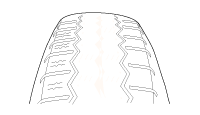
|
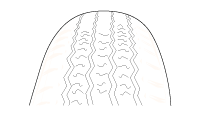
|
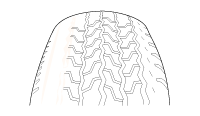
|
| • |
Center-tread down to fabric due to excessive over inflated tires
|
| • |
Excessive toe on drive wheels
|
| • |
Heavy acceleration on drive
|
|
| • |
Worn suspension components
|
| • |
Excessive cornering speeds
|
|
| • |
Toe adjustment out of specification
|
| • |
Camber out of specification
|
|
Partial wear
|
Feathered edge
|
Wear pattern
|
|
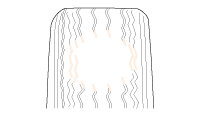
|
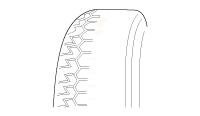
|
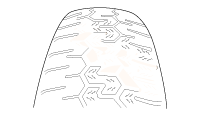
|
| • |
Caused by irregular burrs on brake drums
|
|
| • |
Toe adjustment out of specification
|
| • |
Damaged or worn tie rods
|
|
| • |
Excessive toe on non-drive wheels
|
|
Other information:
Inspection
▶ Inspection flow of the inhibitor switch
▶ Items to check
1.
Inspect DTC code.
2.
Inspect whether N setting matches.
–
Adjust N setting (refer to automatic transmission system - "inhibitor
switch")
3...
Replacement
•
Put on gloves to prevent hand injuries.
•
When removing with a flat-tip screwdriver or remover, wrap protective
tape around the tools to prevent damage to components...
Categories
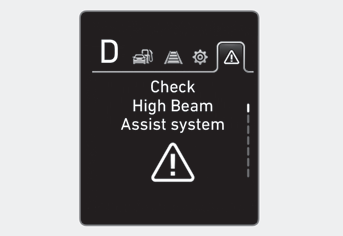
This warning light informs the driver the following situations.
-- Forward Collision-Avoidance Assist system malfunction (if equipped)
-- Forward Collision-Avoidance Assist radar blocked (if equipped)
-- Blind-Spot Collision Warning system malfunction (if equipped)
-- Blind-Spot Collision Warning radar blocked (if equipped)
-- Lamp malfunction (if equipped)
-- High Beam Assist malfunction (if equipped)
-- Tire Pressure Monitoring System (TPMS) malfunction (if equipped)
read more









